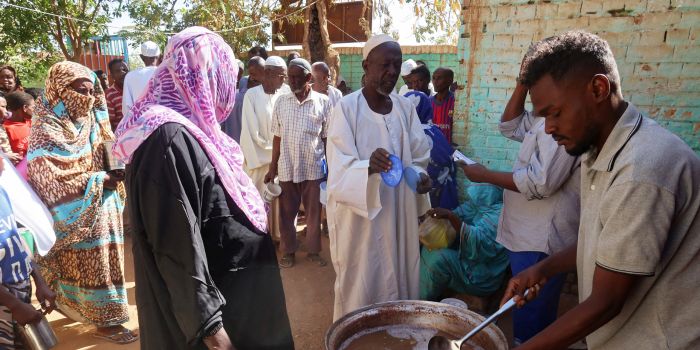Disasters, conflicts displaced nearly 50 million in 2023 - report

Somalia, Palestine, and Sudan were severely affected, says the IDMC report which states that 75.9 million people lived in "internal displacement" across dozens of countries.
Somalia, Palestine, and Sudan saw significant displacement in 2023 as conflicts and disasters forced millions from their homes, according to a report by the International Displacement Monitoring Centre. (IDMC).
The May 14, 2024, report states that 75.9 million people lived in "internal displacement" across dozens of countries last year, including tens of millions displaced in previous years and still unable to return home.
More To Read
- Over 150 Palestinian refugees finally disembark in South Africa after nine-hour airport ordeal
- Portugal recognises State of Palestine
- Human rights activists demand Kenya take action against Gaza genocide as thousands rally in support of Palestine in Nairobi
- Which countries recognize Palestinian statehood?
- Letter from Mideast: From hope to heartbreak - my Gaza since Israel's "disengagement"
- UAE, Jordan reaffirm support for Palestinian rights
Conflict and violence triggered 20.5 million displacements in 2023, while disasters displaced over 26 million people in 148 countries, with 2023 emerging as one of the years with the highest numbers of weather-related displacements in the last decade, though fewer than in 2022.
In Somalia, severe floods compounded the suffering of a nation plagued by drought and civil war, displacing hundreds of thousands.
The Gu (April to June) heavy rains and flash floods have spread to more areas of Somalia and have affected at least 203,438 people. Authorities said they had killed nine people as of May 8, 2024, and caused 37,120 to be displaced or to relocate.
The floods have destroyed and damaged infrastructure, including some 3,080 shelters, 4,702 latrines, and three schools, and killed at least 100 livestock, and according to humanitarian partners, at least 770,000 people could be affected by the time the Gu season ends.
Meanwhile, escalating violence in the Palestinian territories and Sudan contributed to two-thirds of all conflict-related displacements worldwide.
An estimated 630,000 people have fled Israeli attacks in southern Rafah in the past week in 2024, and another 100,000 in Gaza's north.
In Sudan, the repercussions of the conflict continue, with UN High Commissioner for Human Rights Volker Turk expressing horror over the escalating violence in the north Darfur region and another top humanitarian official describing the worsening situation on the ground as "hell on Earth."
Hundreds of thousands of displaced people are still sheltering in al-Fashir without basic supplies amid fears that nearby fighting will turn into an all-out battle for the city, the last stronghold of the Sudanese Armed Forces (SAF) in the western Darfur region.
Disasters frequently overlap with conflict, worsening outcomes for affected populations.
Robert Piper, the special adviser on solutions to internal displacement to the United Nations secretary general, wrote in the report's forward, "While the numbers fluctuate year-on-year, disaster-related displacements remain high in nearly every corner of the world and are often intertwined with conflict dynamics in fragile settings."
Libya, for example, suffered catastrophic floods in September when a cyclone-like weather system known as Storm Daniel overwhelmed two dams in the city of Derna, killing thousands. Experts noted at the time that the country's long history of violent conflict likely contributed to limited investment in maintaining the dams.
Globally, storms and floods were the leading causes of disaster-related displacements, responsible for 19.3 million displacements in 2023.
Wildfires and droughts are also significant drivers, although global data for these events is harder to come by, making comprehensive estimates more difficult. Two-thirds of all wildfire-related displacements in 2023 occurred in Canada and Greece, both of which saw their worst wildfire seasons on record last year.
The report notes that not all disasters were climate-related, with earthquakes driving substantial internal displacements in Turkey, Syria, Afghanistan, Morocco, and the Philippines.
Developing nations typically face higher displacement rates due to their vulnerability to climate impacts. However, some high-income countries, including Canada and New Zealand, saw record disaster-related displacement figures last year. In New Zealand, Cyclone Gabrielle displaced 11,000 people, more than in all the storms in the previous five years combined.
Meanwhile, escalating conflict worldwide continued to drive millions of people from their homes, with some parts of the world disproportionately affected by violence.
Sudan, Palestine, and the Democratic Republic of the Congo accounted for two-thirds of all the conflict-related displacements in 2023.
Before that year, displacements in the Middle East and North Africa had been on the decline for three years, but displacements in Palestinian territories reversed that trend, contributing to an eightfold increase in conflict-related displacements in the region amid the Israel-Hamas war.
Top Stories Today











































